
The Coronavirus Aid, Relief, and Economic Security Act (CARES Act) provides more than $2 trillion in relief for Americans and organizations affected by the COVID-19 pandemic. This historic legislation includes several temporary tax changes and incentives that affect charitable giving. Please see below for a summary of pertinent highlights and resources.
Tax Benefit for Standard Deduction Households
Taxpayers who take the standard deduction are allowed an above-the-line deduction of up to $300 per filing household for charitable contributions made in cash to any qualified 501(c)(3) charity during 2020, excluding donor-advised funds, private foundations, and supporting organizations.
Tax Benefit for Itemizing Households
Taxpayers who itemize their annual returns are allowed a temporary increase on deductions for 2020 charitable contributions. The deduction limit of 60 percent of Adjusted Gross Income (AGI) for cash gifts is suspended for charitable contributions made to any qualifying 501(c)(3) charity, excluding gifts to donor-advised funds, private foundations, and supporting organizations. The deduction rules for contributions to these “non-qualified” charitable vehicles remain unchanged.
The deduction limit of 30 percent of AGI for contributions of appreciated assets (e.g., stock, mutual funds, real estate, closely-held business interests, etc.) also remains unchanged.
Under this new structure, itemizing taxpayers may potentially deduct up to 100 percent of their 2020 AGI via charitable gifts. Taxpayers who make this 100% of AGI election can also carry forward unused qualified cash gift deductions up to five years. The carryforward will be subject to the normal 60% of AGI limit, as will cash deductions carried forward from past years.
The DuPage Foundation recommends that you consult with your tax and financial advisors prior to employing any of these strategies.
Required Minimum Distributions (RMDs) Waived for 2020
Required Minimum Distributions (RMDs) from 401(k)s, 403(b)s, Inherited/Beneficiary IRAs (including traditional and Roth) accounts have been waived for 2020 to allow people to recover from potential market losses and save for future years. Those who have already taken their RMDs generally cannot have the action reversed and the distributions will be counted as taxable income. It may be possible to replace the funds within 60 days as an indirect rollover provided the individual has not done an indirect rollover within the last 365 days (check with your account custodian on any specific requirements they have). It may also be possible to replace the funds beyond 60 days if the account owner meets the CARES Act definition of being “impacted” by COVID-19. Note that if someone has already taken their RMD from an Inherited/Beneficiary IRA, they cannot replace the funds.
Potential workarounds such as the above should be discussed with your advisors.
While RMDs have been waived, Qualified Charitable Distributions (QCDs) from traditional and other certain types of IRAs are still allowed and remain an excellent tax-advantageous giving tool. Consider giving QCDs in lieu of other taxable assets to offset RMDs in future tax years. QCDs may be made to the Foundation’s COVID-19 Response Fund as well as to any of our unrestricted, field-of-interest, and designated funds.
Annual QCD limits remain at $100,000 per individual and $200,000 per couple with contributions to donor-advised funds, private foundations, and supporting organizations prohibited.
Per the new rules on QCDs established under the SECURE Act, deductible contributions made by donors 70 ½ and older to their IRAs will reduce their QCD limit in kind by the amount of the contribution for the year the contribution is made.
Tax Benefits for Corporate Giving
For corporations, the 10% gross income-based limitation is increased to 25% for charitable contributions made in cash to any qualifying 501(c)(3) charity, excluding donor-advised funds, private foundations, and supporting organizations for 2020.
Resources
For more information about the implications of the CARES Act on charitable giving, please see the following links:
- CARES Act (Full text)
- PG Calc Overview of the CARES Act on Charitable Giving
- Northern Trust (Our Investment Advisor’s Summary on the Implications of the CARES Act)
The content provided above and throughout this website is for informational purposes only and should not be construed as or relied upon as legal or tax advice. The DuPage Foundation does not provide legal or tax advice and recommends that you consult with your tax attorney and other members of your professional advisor team prior to making a significant charitable gift.

